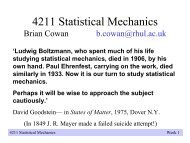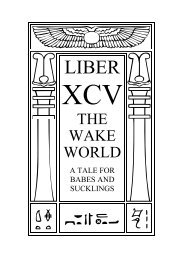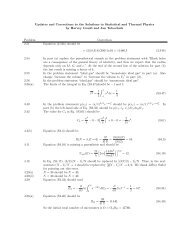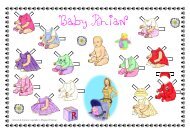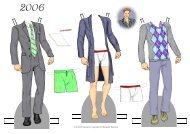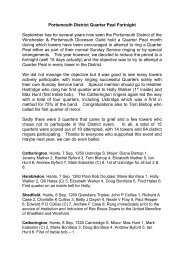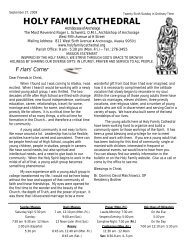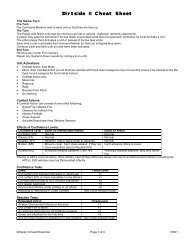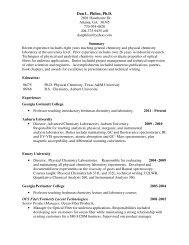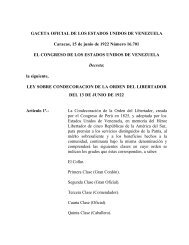A Critique of The German Ideology
A Critique of The German Ideology
A Critique of The German Ideology
Create successful ePaper yourself
Turn your PDF publications into a flip-book with our unique Google optimized e-Paper software.
you like. <strong>The</strong>y themselves begin to distinguish themselves from animals as soon as they<br />
begin to produce their means <strong>of</strong> subsistence, a step which is conditioned by their physical<br />
organisation. By producing their means <strong>of</strong> subsistence men are indirectly producing their<br />
actual material life.<br />
<strong>The</strong> way in which men produce their means <strong>of</strong> subsistence depends first <strong>of</strong> all on the<br />
nature <strong>of</strong> the actual means <strong>of</strong> subsistence they find in existence and have to reproduce.<br />
This mode <strong>of</strong> production must not be considered simply as being the production <strong>of</strong> the<br />
physical existence <strong>of</strong> the individuals. Rather it is a definite form <strong>of</strong> activity <strong>of</strong> these<br />
individuals, a definite form <strong>of</strong> expressing their life, a definite mode <strong>of</strong> life on their part.<br />
As individuals express their life, so they are. What they are, therefore, coincides with<br />
their production, both with what they produce and with how they produce. <strong>The</strong> nature <strong>of</strong><br />
individuals thus depends on the material conditions determining their production.<br />
This production only makes its appearance with the increase <strong>of</strong> population. In its turn this<br />
presupposes the intercourse [Verkehr]1 <strong>of</strong> individuals with one another. <strong>The</strong> form <strong>of</strong> this<br />
intercourse is again determined by production.<br />
<strong>The</strong> relations <strong>of</strong> different nations among themselves depend upon the extent to which<br />
each has developed its productive forces, the division <strong>of</strong> labour and internal intercourse.<br />
This statement is generally recognised. But not only the relation <strong>of</strong> one nation to others,<br />
but also the whole internal structure <strong>of</strong> the nation itself depends on the stage <strong>of</strong><br />
development reached by its production and its internal and external intercourse. How far<br />
the productive forces <strong>of</strong> a nation are developed is shown most manifestly by the degree to<br />
which the division <strong>of</strong> labour has been carried. Each new productive force, ins<strong>of</strong>ar as it is<br />
not merely a quantitative extension <strong>of</strong> productive forces already known (for instance the<br />
bringing into cultivation <strong>of</strong> fresh land), causes a further development <strong>of</strong> the division <strong>of</strong><br />
labour.<br />
<strong>The</strong> division <strong>of</strong> labour inside a nation leads at first to the separation <strong>of</strong> industrial and<br />
commercial from agricultural labour, and hence to the separation <strong>of</strong> town and country and<br />
to the conflict <strong>of</strong> their interests. Its further development leads to the separation <strong>of</strong><br />
commercial from industrial labour. At the same time through the division <strong>of</strong> labour inside<br />
these various branches there develop various divisions among the individuals<br />
co-operating in definite kinds <strong>of</strong> labour. <strong>The</strong> relative position <strong>of</strong> these individual groups<br />
is determined by the methods employed in agriculture, industry and commerce<br />
(patriarchalism, slavery, estates, classes). <strong>The</strong>se same conditions are to be seen (given a<br />
more developed intercourse) in the relations <strong>of</strong> different nations to one another.<br />
<strong>The</strong> various stages <strong>of</strong> development in the division <strong>of</strong> labour are just so many different<br />
forms <strong>of</strong> ownership, i.e. the existing stage in the division <strong>of</strong> labour determines also the<br />
relations <strong>of</strong> individuals to one another with reference to the material, instrument, and<br />
product <strong>of</strong> labour.<br />
<strong>The</strong> first form <strong>of</strong> ownership is tribal [Stammeigentum]1 ownership. It corresponds to the



